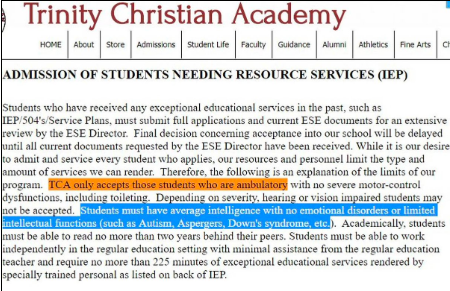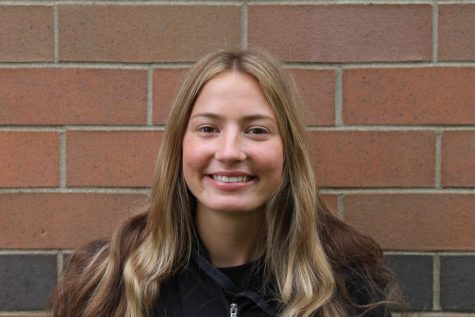School vouchers hurt public schools and communities

Trinity Christian Academy High school
Trinity’s policy regarding the admission of students needing resource services.
February 15, 2023
In theory, it sounds like a relatively harmless idea. In reality, it would promptly deteriorate the fabric that holds communities and public schools together. Bills in support of school vouchers continue to pass in states across the country. Vouchers have the potential to inflict dire consequences on public schools by discretely detracting from their funding.
The professed goal of voucher programs is to ensure that all students have access to high quality education regardless of their background or place of residence. Voucher programs are often referred to as “school choice” programs and used interchangeably with “Education Savings Accounts” (ESAs). Essentially, vouchers aim to provide all students the opportunity to attend any school they choose.
The money to support these programs comes from the tax dollars and government funding that currently support public schools. Blatantly, vouchers divert money that would otherwise go towards public education to private schools, often including religiously affiliated private schools.
Over 20 states in the U.S. have already passed voucher programs, according to EdChoice. The states that spend the most money on their voucher programs include Florida, Wisconsin, Indiana, Vermont, and, most recently, Arizona. Michigan has not passed any bills in support of vouchers, though former Secretary of Education Betsy Devos (a name not unfamiliar to the city of Holland), notably proposed a voucher-like school choice program coined “Let MI Kids Learn” in 2022. The policy claims it will assist in “changing public education” through Student Opportunity Scholarships. According to Devos’ website, these scholarships can be used for any educational expense, including “tuition at a private school.” Looking past its benevolent delivery of humanitarian ideals, Devos’ proposal has the same goal of every voucher program like it, that is “to weaken public education until only private options remain,” says Kalena Thomhave, a Pittsburgh-based writer and researcher on social policy, poverty, and inequality.
West Ottawa Assistant Principal Jake Manning says that he and other administrators have met to discuss the possibility of a voucher program passing in the state of Michigan and what that would look like for West Ottawa. However, he said these meetings seldom happen as vouchers “remain mostly hypothetical at this point. The states that have adopted a voucher system . . . have not had the success academically and socially that would lead me to believe that other states, like Michigan, will want to follow suit,” Manning said.
The reality is that when vouchers pass, public schools are deprived of a proportion of their funding and consequently deprived of resources they would have otherwise had. Lack of funding in public schools will lead to teacher shortages. Class options and extracurriculars will be cut, students will be deprived of learning materials and technology, and ultimately, schools will fall short of meeting students’ needs.
Andrew D. Catt, the director of state research and special projects for EdChoice, a pro-voucher organization, says “the data doesn’t back up the claims that public schools will be destroyed or defunded” because the amount of diverted money is such a negligible percent of the funding for public education. Even if this claim were true, the foundation and intention behind the voucher movement is corrupt and disingenuous. American citizens pay taxes with the notion that their money is supporting the better secular education of all children, not the private religious education of a few.
A state with one of the most corrupt frameworks for education, Florida, spent an estimated $1.3 billion on vouchers in 2022 according to education reporter Kate Payne. Supporters of school-choice programs claim that their goal is to provide all students with an opportunity to attend the school they want, yet Florida’s school-choice policy warrants blatant intolerance for certain groups of people in voucher schools. Under Florida’s school-choice policy, voucher schools are permitted to expel a student who claims to be homosexual.
Trinity Christian Academy, a school in Volusia, Florida that received over $1.5 million from vouchers as of 2019, readily denies enrollment to students with any mental or physical disability.
Disability inclusion is a basic civil right. Unfortunately, the Americans with Disabilities Act does not apply to churches, and since Trinity is a church run school it is within its rights to deny admission to students with disabilities according to Orlando Sentinel columnist Scott Maxwell. Circumstances of injustice and casual discrimination like this are far too common in Florida schools. Voucher schools need to be held accountable. If schools are publicly funded, they need to benefit the public. It is that simple.
Though many parents and school choice advocates claim that all students should have access to private education for academic reasons, data indicates that this is not the real reason why students switch. According to an EdChoice survey of parents who use vouchers, the number one reason parents chose to use vouchers was “religious environment/instruction.” This is problematic. The public funding of private religious schools is a violation of the separation of church and state.
Increasingly often we hear the argument that public schools are guilty of “indoctrination,” brainwashing students to adhere to radically liberal ideas and, somehow consequently, causing a decline in reading and math scores. According to communications specialist, taxpayer activist, author, and philanthropist Robert Basmadjian, some go so far as to say that public schools are “reframing history” and “convinc[ing] the easily influenced minds of our children that America is inherently ‘racist and evil,'” by teaching Critical Race Theory.
The hypocrisy!
Manning says that when he gives tours to families, “many of whom are transferring from private schools to West Ottawa, what I often hear from students and parents are some of the distinctives that make West Ottawa great. People choose West Ottawa for many reasons, but pieces like our area-leading academic course offerings, social and ethnic diversity, top-tier extra curricular programming like our arts and athletics, and a desire to participate in a true and proud community school model most commonly lead people to West Ottawa.”
“I like that at public school, specifically West Ottawa, there are so many different types of people. It keeps things interesting and entertaining, and it’s a more accurate representation of the real world.”
-Reagan Valk, Sr.
“I like how at West Ottawa you can meet people from all different backgrounds.”
-CJ Guillermo, Sr.
“I like how many resources are available to us. Here, everyone is able to get the help they need.”
-Emily Book, Sr.
“I like that there’s a lot of people here and a large variety of classes. I love going to a big school.”
-Jenna Dirkse, Sr.
School vouchers benefit a select group of people and undermine the rights of everyone else. Public schools like West Ottawa that are inclusive, diverse, compassionate, and full of brilliant students and staff prove the futility and fruitlessness of the voucher movement.




